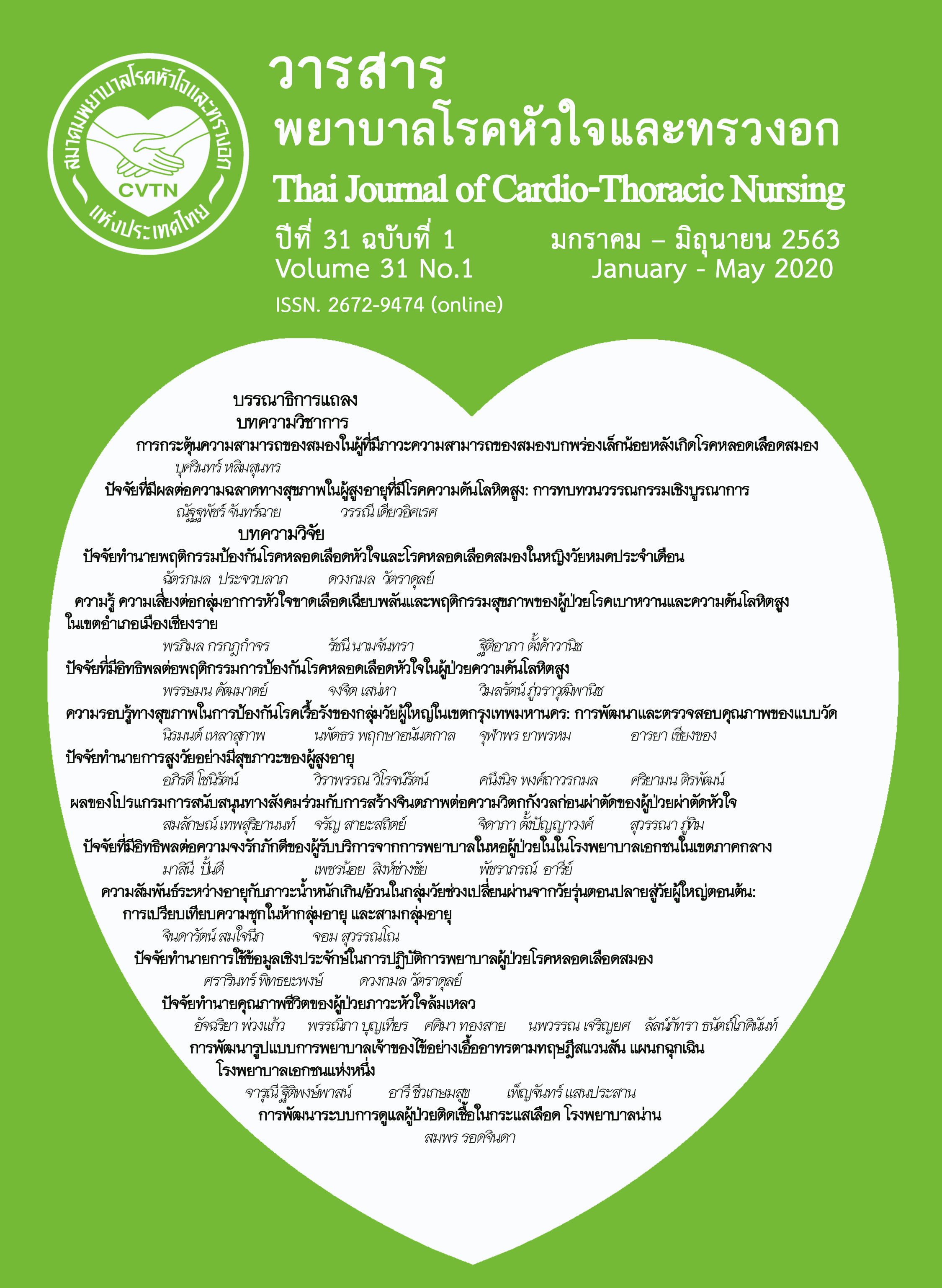Cognitive stimulation in post-stroke patients with mild cognitive impairment
Keywords:
cognitive stimulation, mild cognitive impairment, strokeAbstract
Mild Cognitive Impairment following stroke is the most common defects. Patients with this condition have impaired cognitive function in more than 1 area, can perform basic activities normally, but they need more time. If not diagnosed and corrected, it will cause more deterioration until dementia can occur. There is a chance of recurrent stroke due to poor compliance and discontinuous treatment. It also slows down the diagnosis of other complications. This article will provide suggestion for post-stroke patients with mild cognitive impairment about the appropriately cognitive stimulation program. From the literature review found that cognitive stimulation program will have cognitive function which found commonly in impairment as executive function, learning and memory, and complex attention. Activities often have computer based game that can be practiced individually. However, there are limitations in aphasia group. The duration of the training could inconclusive because each study is very different.
References
2. Lo Coco D, Lopez G, Corrao S. Cognitive impairment and stroke in elderly patients. Vasc Health Risk Manag. 2016;12:105-116.
3. Keanduangchum J. Poststroke Dementia. Journal of Thai Stroke Society. 2015; 14(3):146-152. (in Thai).
4. Chanchaem R, Wongcharoen S. Prevalence of post-stroke dementia in northern Thailand. Journal of the Department of Medical services. 2018; 43(2):124-30. (in Thai).
5. Aphisitphinyo S, Rangseekajee P, Paholpak P, Paholpak P, Phuttharak W. Characteristics of behavioral and psychological symptoms of dementia in patients with major neurocognitive disorder due to vascular disease. Journal of Psychiatric Association of Thailand. 2019; 64(4): 371-84. (in Thai).
6. American Psychiatric Association. Diagnostic and statistical manual of mental disorders. 5th ed. Washington: American Psychiatric Association; 2013.
7. Tongbupa S, Kaewsriwong S. Executive function training programs for stroke patients with cognitive impairment: literature review. Songklanagarind Journal of nursing. 2018; 38(2): 124-31. (in Thai).
8. Albert MS, DeKosky ST, Dickson D, Dubois B, Feldman HH, Fox NC, et al. The diagnosis of mild cognitive impairment due to Alzheimer’s disease: recommendations from the National Institute on Aging-Alzheimer’s Association workgroups on diagnostic guidelines for Alzheimer’s disease. Alzheimers Dement. 2011; 7(3): 270-9.
9. Muangpaisan W. Criteria for diagnosis of dementia [Internet]. Bangkok: Faculty of Medicine, Siriraj Hospital; 2015. [cited 2019 Sep 24]. Available from: http://www.si.mahidol.ac.th/ project/ geriatrics/network_title1_2.html#
10. Farias ST, Mungas D, Reed BR, Harvey D, DeCarli C. Progression of mild cognitive impairment to dementia in clinic- vs community based cohorts. Arch Neurol. 2009; 66(9):1151-7.
11. Delavaran H, Jonsson AC, Lovkvist H, Iwarsson S, Elmstahl S, Norrving B, et al. Cognitive function in stroke survivors: a 10-year follow-up study. Acta neurol Scand [Internet]. 2017 [cited 2019 Sep 24]; 136(3): 187-94. Available from: https://onlinelibrary. wiley.com/doi/abs/10.1111/ ane.12709
12. Qu Y, Zhuo L, Li N, Hu Y, Chen W, Zhou Y, et al. Prevalence of post-stroke cognitive impairment in China: a community-based, cross-sectional study. PLoS One [Internet]. 2015 [cited 2019 Sep 24]; 10: e0122864-e. Available from:https://www.ncbi.nlm.nih.gov/pmc/articles/PMC4395303/pdf/pone. 0122864.pdf.
13. Jacquin A, Binquet C, Rouaud O, Graule-Petot A, Daubail B, Osseby GV, et al. Post-stroke cognitive impairment: high prevalence and determining factors in a cohort of mild stroke. J Alzheimers Dis [Internet]. 2014 [cited 2019 Sep 24]; 40(4): 1029-38. Available from: https://www. ncbi.nlm.nih.gov/pubmed/24577459
14. Suksatit B, Tiengburanathum P. Mild cognitive impairment among patients with ischemic stroke: prevalence, characteristics, and its related factors. Nursing Journal. 2017; 44(1): 149-60. (in Thai).
15. Siriraj stroke Center Faculty of Medicine, Siriraj Hospital. The current situation of stroke [Internet]. Bangkok: Faculty of Medicine, Siriraj Hospital; 2019 [cited 2019 Sep 24]. Available from: https:// www.si.mahidol.ac.th/sidoctor/e-pl/admin/article_ files/1256_1.pdf
16. Mijajlovic MD, Pavlovic A, Brainin M, Heiss WD, Quinn TJ, Ihle-Hansen HB, et al. Post-stroke dementia - a comprehensive review. BMC Medicine 2017; 15(1): 1-12.
17. Prasat Neurological Institute, Department of Medicine. Clinical practice guidelines: dementia. Bangkok: Prasat Neurological Institute; 2014. (in Thai).
18. Cumming TB, Tyedin K, Churilov L, Morris ME, Bernhardt J. The effect of physical activity on cognitive function after stroke:a systematic review. Int Psychogeriatr. 2012; 24(4):557–67.
19. Anothaisintawee T, Thamakaison S, Srisuwan P. Systematic review of dementia prevention in elderly. Bangkok: Foundation of Thai gerontology research and development institute; 2014.
20. The Joanna Briggs Institute. Reviewers’ manual 2014 edition [Internet]. 2014 [cited 2019 Sep 24]. Available from: https://nursing.lsuhsc.edu/J BI/docs/ReviewersManuals/ReviewersManual.pdf (in Thai).
21. Zucchella C, Capone A, Codella V, Vecchione C, Buccino G, Sandrini G, et al. Assessing and restoring cognitive functions early after stroke. Funct Neurol [Internet]. 2014 [cited 2019 Sep 26]; 29(4): 255-62. Available from: https:// www.ncbi. nlm.nih.gov/pubmed/2576 4255
22. Cho Dong-Rae, Lee Sang-Heon . Effects of virtual reality immersive training with computerized cognitive training on cognitive function and activities of daily living performance in patients with acute stage stroke: a preliminary randomized controlled trial. Medicine (Baltimore) [Internet]. 2019 [cited 2019 Sep 26]; 98(11): 1-7. Available from: https://www.ncbi.nlm.nih.gov/ pmc/articles/PMC6426620/pdf/medi-98-e1475 2.pdf
23. Oh EY, Jung MS. Effects of a cognitive training program on cognitive function and activities of daily living in patients with acute ischemic stroke. J Korean Acad Nurs [Internet]. 2017 [cited 2019 Sep 26]; 47(1):1-13. Available from:https://www.ncbi.nlm.nih.gov/pubmed/28262650
24. Poulin V, Korner-Bitensky N, Bherer L, Lussier M, Dawson DR. Comparison of two cognitive interventions for adults experiencing executive dysfunction poststroke: a pilot study. Disabil Rehabil [Internet]. 2017 [cited 2019 Sep 26]; 39(1): 1-13. Available from: https://www.ncbi.nlm .nih.gov/pubmed/26750772.
25. Bo W, Lei M, Tao S, Jie LT, Qian L, Lin FQ, et al. Effects of combined intervention of physical exercise and cognitive training on cognitive function in stroke survivors with vascular cognitive impairment: a randomized controlled trial. Clin. Rehabil. [Internet]. 2019[cited 2019 Sep 26]; 33(1): 54–63 Available from: https://doi.org/10.1177/ 02692 15518791007
26. Prasunnakarn S, Khammathit A, Yothathai T, Sakulkoo P. Early screening of senile dementia in community based care: a systematic review. Journal of Health Science [Internet]. 2017[cited 2020 March 20]; 26(1): 125–38 Available from: http://www.bcnu.ac.th/research/attachments/documents/2560/02in2560.pdf. (in Thai).
27. Arba F, Quinn T, Hankey GJ, Inzitari D, Ali M, Lees KR, et al. Determinants of post-stroke cognitive impairment: analysis from VISTA. Acta Neurol Scand. 2017; 135(6): 603-7.
Downloads
Published
How to Cite
Issue
Section
License
บทความนี้ยังไม่เคยตีพิมพ์หรืออยู่ในระหว่างส่งไปตีพิมพ์ในวารสารอื่น ๆ มาก่อน และกองบรรณาธิการขอสงวนสิทธิ์ในการตรวจทาน และแก้ไขต้นฉบับตามเกณฑ์ของวารสาร ในกรณีที่เรื่องของท่านได้ได้รับการตีพิมพ์ในวารสารฉบับนี้ถือว่าเป็น ลิขสิทธิ์ของวารสารพยาบาลโรคหัวใจและทรวงอก






